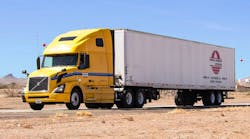When we first came up with the idea to conduct Run on Less Regional, we did so without really having a target mpg in mind. We knew because of a combination of factors — the rise of e-commerce and drivers’ desire to be home more often — that regional haul was a growing part of the trucking industry. But given the various iterations of regional haul — drop and hook, multiple stop, out and back, backhauls — we were not ready to select a target mpg. However, we did want to establish some sort of benchmark, so we assembled a team of 10 trucks and 10 drivers, and over the course of three weeks had them go about their normal course of business.
The end results are in and the trucks and drivers hit an impressive 8.3 mpg for the three weeks of the Run. This was a significant improvement over the national average of 6.0 mpg in regional haul applications. In fact, the nine diesel trucks averaged 8.7, with the lone CNG tractor doing very well on fuel.
That average mpg for the Run meant the 10 fleets — C&S Wholesale Grocers, Hirschbach, Hogan Transportation, J.B. Hunt, Meijer, PepsiCo, Ploger Transportation, Schneider, Southeastern Freight Lines, and United Parcel Service — saved 2,750 gallons of fuel, $8,249 and 27.9 tons of carbon dioxide emissions.
If all carriers in regional operation hit this 8.3 mpg average vs. the current 6 mpg, the average annualized savings would be more than $9 billion. That is a big number.
I want to remind folks that the fleets spec’d the trucks using only commercially available technologies. NACFE staff went over each truck to make sure there were no products in beta testing or homemade fuel savings devices on the trucks. We wanted to show what was possible in the real world. And we did just that.
We also came away from the Run with some other key learnings:
- High efficiency requires a commitment from both fleet leadership and drivers.
- Big data and connectivity can be used to further optimize for each route.
- Diversity in duty cycles makes it essential that fleet managers understand the nuances of their businesses so they can spec vehicles properly and coach drivers in efficient driving techniques.
- The expansion of regional haul will help attract and retain drivers as they get home on a more regular basis.
- Because of its return-to-base operation, regional haul is ideal for alternative-fuel vehicles, especially battery-electric trucks.
I would be remiss if I did not thank the 10 drivers —Louis Scaruffi, Mark Casey, Glen Williams, Dustin Whitener, Rita Bare, Lou Martinez, Travis Lauer, Michael Tam, Beau White, and Darin Salgado — for their part in demonstrating that when drivers commit to fuel efficiency, they can make a big difference. And sharing the joy and challenges in driving these new tractors and trailers with so much new technology.
As with Run on Less 2017, what we do is about more than just a quick overview of the results right after the event concludes. Our team is already hard at work sifting through and analyzing all the data we got from the Run since the trucks were equipped with both Geotab devices and data loggers from NREL.
The full report of our findings will be out in mid-2020. We hope this will help all fleets involved in regional haul to start adopting the technologies and practices that get them to 8.3 mpg. In the meantime, spend time on the Run on Less website, as there is plenty there to learn.




